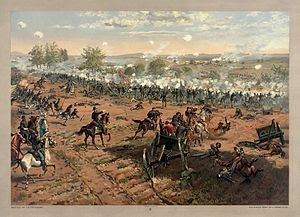 |
| According to Wikipedia, this is one of only two photographs of Lincoln at Gettysburg on 11/19/1863. |
If you haven't read the Gettysburg Address since you were in high school, take a moment of two to read it and think about what Lincoln was saying. Reflect upon the timelessness of the message.
Four score and seven years ago our fathers brought forth on this continent, a new nation, conceived in Liberty, and dedicated to the proposition that all men are created equal.
Now we are engaged in a great civil war, testing whether that nation, or any nation so conceived and so dedicated, can long endure. We are met on a great battle-field of that war. We have come to dedicate a portion of that field, as a final resting place for those who here gave their lives that that nation might live. It is altogether fitting and proper that we should do this.
But, in a larger sense, we can not dedicate -- we can not consecrate -- we can not hallow -- this ground. The brave men, living and dead, who struggled here, have consecrated it, far above our poor power to add or detract. The world will little note, nor long remember what we say here, but it can never forget what they did here. It is for us the living, rather, to be dedicated here to the unfinished work which they who fought here have thus far so nobly advanced. It is rather for us to be here dedicated to the great task remaining before us -- that from these honored dead we take increased devotion to that cause for which they gave the last full measure of devotion -- that we here highly resolve that these dead shall not have died in vain -- that this nation, under God, shall have a new birth of freedom -- and that government of the people, by the people, for the people, shall not perish from the earth.
- Abraham Lincoln, "Gettysburg Address" (Nov. 19, 1863)Maybe the speech is so powerful because of the economy of words. Sometimes, you see, less can be more. Great oration doesn't mean long oration. We can all take a lesson from Lincoln, sometimes when we strip a speech (or writing) to its very essence, we enhance not only its meaning but its effectiveness.
While he pays homage to those who died, Lincoln also challenges the rest of us - those who lived during the Civil War, and those generations that came later - to ensure that our representative democracy survived. At the time Lincoln gave his speech there were still millions held in slavery. At the time of the speech, neither free blacks nor women had the right to vote.
Since that time the word people has taken on new meanings - and it will continue to take on new meanings into the future. The road has not always been easy and the course has not always been straight, but as we expand the meaning of the word people we get closer to that government of, by and for the people that Lincoln spoke so reverently of.

